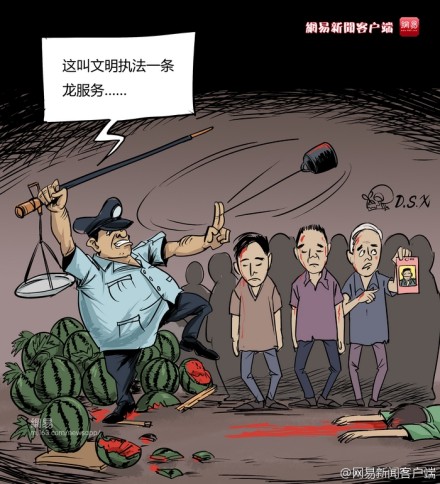China’s chengguan urban management officials have earned much public scorn for their tendency to use excessive force while enforcing municipal bylaws—often on illegal street vendors, some of whom have been beaten or even killed by the heavy-handed para-police. In addition to public criticism, their negative reputation has also inspired violence against them. At Sixth Tone, Nathan Jubb reports that Beijing has opened public consultation on draft legislation defining—and perhaps expanding—the scope of chengguan’s duties:
The government is seeking input ahead of drafting legislation on city management law enforcement that will set a national standard for how chengguan do their jobs. Throughout China, the officers are tasked with enforcing low-level city rules, and one of the most common tasks is clearing streets of illegal vendors. But the scope of chengguan work can vary from city to city. By law, issuing punishments for motor vehicle parking violations falls under the remit of traffic police, but in practice this responsibility falls to chengguan in some cities, such as Ningbo in eastern China’s Zhejiang province.
[…] The new law could potentially expand the powers of China’s city management officials at a time when the public still has doubts about the ability of chengguan to exercise their authority fairly. Only last month, a city management official in the central province of Henan was stabbed to death by a street vendor, allegedly after a fight between the officer and the vendor’s wife. The incident once again ignited debate about whether chengguan in China’s towns and cities use excessive force.
But to their credit, chengguan are waking up to the need for transparency. In June, city management officials in the capital of central China’s Henan province live-broadcasted their work for a night in a bid to improve accountability and public relations — a move which drew criticism for potentially infringing on citizens’ rights to privacy. [Source]
The draft legislation now open for public comment proposes that chengguan enforce municipal regulations in six main areas, which has led some to worry could lead to additional abuses of power. From Catherine Wong at the South China Morning Post:
The Ministry of Housing and Urban-Rural Development has proposed that the officers who enforce local by-laws should cover six main areas, the Beijing Times reported.
These include enforcing regulations on parking, noise pollution in residential areas and serving food in public areas.
[…] The ministry’s proposals have attracted heated discussion online in China.
Many said they could lead to greater abuses of power by chengguan.
Others expressed concerns that people could be penalised twice, by the police and the chengguan. [Source]
The draft is open for public consultation until September 18. Opening draft legislation to public comment, a tactic that has been used sparsely throughout the history of the PRC, has in recent years and along with China’s adoption of the internet become far more common. For more on the practice, see a CDT interview with George Washington University’s Steven J. Balla, where he warns that a lack of disclosure of public commentary can merely “provide a veneer of popular legitimacy to decisions that government officials have already made behind closed doors.” See also the translation of a State Council document guiding official response to public opinion from China Law Translate.








